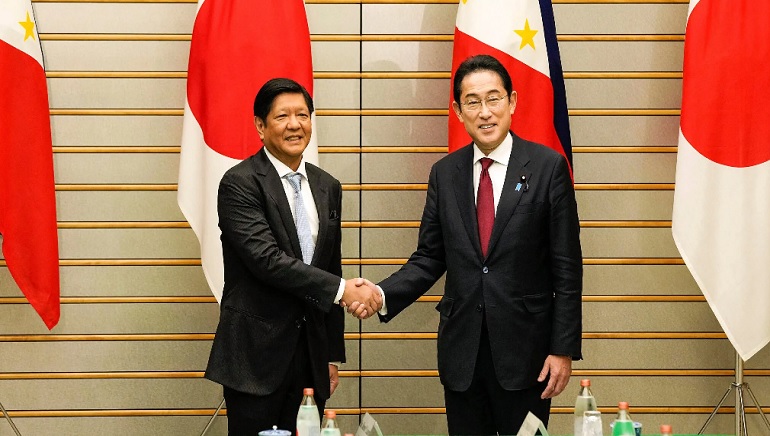
- The defence engagement between Japan and the Philippines in the Indo-Pacific region would contribute to balancing China’s rise and promoting a free and open regional order.
- The region needs more cooperation and coordination among countries that share common values and interests to ensure regional stability and security and Japan and the Philippines are two important actors in this regard.
- The U.S. has also been seeking to strengthen its trade and economic relations with Japan and the Philippines as part of its strategy to counter China’s rise.
As Japan tries to diversify its security alliance beyond the United States, the Republic of the Philippines remains one of its key strategic partners for Japan. On February 9, 2023, Japanese Prime Minister Fumio Kishida held a summit meeting with the president of the Republic of the Philippines, Ferdinand R. Marcos. At the summit, PM Kishida highlighted the importance of Japan-Philippines cooperation as maritime neighbours, amidst the growing complexities in the international arena. Both the leaders agreed to boost their defence ties significantly allowing the Japanese troops greater territorial access to the Philippines, as the tensions continue to spike with growing Chinese engagement in the region.
Both leaders have made the first move towards a greater defence engagement, which might later turn into a comprehensive defence partnership.
Converging Strategic Interests
Japan and the Philippines share a strategic interest in the Indo pacific region. Japan seeks to expand its economic footprints across the Indo pacific and the Philippines, being a like-minded partner, must leverage it’s strengthening ties with Tokyo. Both countries support the establishment of rule-based order in the Indo-Pacific. Japan and the Philippines have been holding talks amid concerns about China’s increasing maritime assertiveness in the South and East China Seas.
Given, both countries are equally affected by China’s power projections and manoeuvres, Tokyo and Manila share similar strategic interests which are to block Chinese ambitions in the region and maintain a rule-based international order abiding by the principle of a Free and Open Indo-Pacific (FOIP). Beijing has been attempting to break through the first island chains which is a defence line drawn by China off the coast running in an area that includes Japan’s Okinawa, Taiwan and the Philippines. This has created alarming concerns for both nations.
For Japan, the Philippines is geopolitically important as China flexes its muscles beyond the ‘first island chains’. In an era of US-China competition, it is in the interest of both Manila and Tokyo that regional peace and stability be enhanced through Washington’s continuous engagements in the Indo-Pacific.
Tracing Japan- Philippines Defense engagements
In recent decades, Japan and the Philippines have attempted to upgrade their ties to the next level. Since 2015, Tokyo and Manila have conducted 17 joint naval exercises, mostly focused on Humanitarian aid and Disaster relief operations. Japan has also served as an observer during the US-Philippines Balikatan military exercises. In 2019, Japan and the Philippines held their first Joint naval drills in the South China Sea, involving two Japanese destroyers and Philippines patrol vessels. The drills aimed to enhance maritime security cooperation and interoperability. Furthermore, In October 2022, the US Marines simultaneously launched two large-scale bilateral exercises with Tokyo and Manila across the first island chains, involving more than 5,500 personnel. The exercises were Resolute Dragon 22 in Hokkaido, Japan and Kamanda 6 across Luzon, Batanes and Palawan in the Philippines.
Recent Initiatives
Japan and the Philippines are two key partners of the United States in the Indo pacific region, where they face common security challenges posed by China’s rise and assertiveness. On February 9, 2023, the leaders of Japan and the Philippines met in Tokyo and signed several agreements to boost their defence cooperation and joint capabilities to respond to emergencies and contingencies. The two countries affirmed an “enhanced defence and security cooperation through bilateral consultations at all levels, including the foreign and defence ministerial meetings 2+2, the vice-ministerial Strategic Dialogue and the political and military (PM) dialogue.”
The two leaders also welcomed their agreement on humanitarian assistance and disaster relief (HADR) of Japan’s self-defence force in the Philippines which would simplify procedures for visit to the Philippines by JSDF in order to facilitate cooperation in HADR. Furthermore, both Tokyo and Manila affirmed the “transfer of defence equipment and capacity building.”
Implications for the Indo-Pacific Region
These developments reflect the shared commitment of Japan and the Philippines to uphold the rules-based order and freedom of navigation in the Indo-Pacific region, where China has been expanding its influence and presence, especially in the South China Sea. China claims most of the disputed waters, including areas that belong to the Philippines’ exclusive economic zone.
The U.S. has also been seeking to strengthen its trade and economic relations with Japan and the Philippines as part of its strategy to counter China’s rise. The three countries share a common vision of a free and open Indo-Pacific that respects sovereignty, democracy, human rights, and international law.
The Indo-Pacific region is undergoing a strategic transformation as China’s rise reshapes the security order. The region needs more cooperation and coordination among countries that share common values and interests to ensure regional stability and security. Japan and the Philippines are two important actors in this regard, as they have strengthened their defence cooperation with each other and with the United States. Their defence engagement in the Indo-Pacific region would contribute to balancing China’s rise and promoting a free and open regional order.
(Muskan holds a post-graduation degree in International Relations from Jadavpur University, Kolkata. Her area of research interest includes East Asia with a special focus on Japan.)
